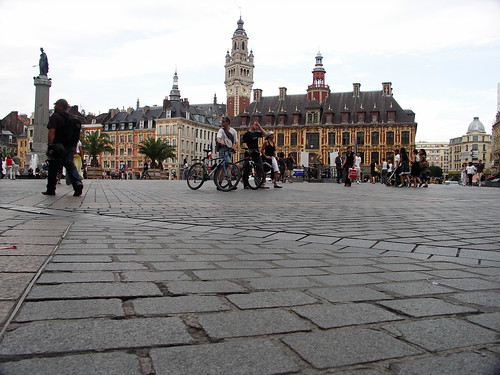Aurais-je perdu le Nord? (Fr and Eng)
See English version below
Dans son superbe essai intitulé Nord Perdu, Nancy Huston écrivain originaire de Calgary, (Canada) mais vivant en France depuis 1973, rédige la plupart de ses œuvres en français et partage ses réflexions sur la notion de « perdre le nord ». Elle traite ce sujet par rapport à son statut d’expatriée. Huston affirme que, en le quittant, elle a « abandonné, trahi et perdu » le Grand Nord qui était sa patrie.
Je viens d’un autre nord, celui de la France (qui, bien entendu, est « le nord vrai ») et, moi aussi, en le quittant, je l’ai abandonné, trahi et perdu.
Ma définition favorite de « perdre le nord » est « être psychologiquement dans l’embarras le plus profond ». Et c’est exactement cette confusion dont mon statut d’expatriée me vaut de faire l’expérience depuis 1975, l’année où je me suis installée aux États-Unis de manière permanente. Je me dis souvent que personne d’important dans ma vie ne peut me percevoir dans ma totalité, parce que je suis la somme de deux moitiés qui sont à la fois distinctes et, néanmoins, mutuellement impliquées dans une dialectique irrémédiable : l’une est la partie française de ma vie, mes vingt-trois premières années, et le reste, la partie américaine, les trente-six années de ma vie adulte.
Tout ce qui est fondamentalement français en moi ne peut être appréhendé par les américains qui me sont proches, et tout ce qui est intrinsèquement américain en moi reste indéchiffrable à ma famille et mes amis français. Pour citer Nancy Huston, « entre l’avant et le maintenant, il y a rupture ».
Et c’est ce sentiment de n’être jamais plus qu’un demi-moi qui devait m’entraîner dans un vortex de déprime pendant les deux ou trois premières années de ma vie aux États-Unis. Je m’en suis remise, mais certaines cicatrices ne disparaissent jamais. Je me souviens avoir été l’observatrice détachée de conversations, lors de soirées entre amis, qui portaient sur les programmes de télé que mon mari et ses amis regardaient quand ils étaient enfants. Il m’était alors doublement impossible de participer à ces conversations, parce que :
Premièrement, je ne connaissais aucun de ces programmes télévisés (sauf ceux qui auraient pu être diffusés en France dans les années soixante) et deuxièmement, les autres n’auraient rien compris si je leur avais dit que je regardais L’Inspecteur Leclerc, Thierry La Fronde et Belphégor quand j’étais petite.
Comme le fait remarquer Nancy Huston dans Nord perdu, « les êtres d’origine étrangère ne seront jamais français [j’ajoute ici: ou américains] parce que personne ne peut leur donner une enfance française [ou américaine] ». Mon manque d’enfance américaine me prive d’un moi tout à fait américain et, corollairement, mon manque de vie adulte française me prive d’un moi tout à fait français.
Je vis donc, pour utiliser une autre image qui manque un peu d’élégance, « le cul entre deux chaises ». Je ne suis jamais assise confortablement dans une de mes deux cultures, mais je vacille constamment entre l’une et l’autre. Et je fais un oui vigoureux de la tête quand je lis ceci dans Nord perdu:
« Ce que vous pensez, dites, lisez, voyez dans la vie de tous les jours depuis des décennies n’a aucun intérêt pour les gens de chez vous [i.e. votre pays d’origine]. Parce qu’ils ne connaissent pas, […] donc ils s’en moquent. Ils ont d’autres chats à fouetter. »
Je suis souvent frustrée de ne pouvoir partager d’une part avec ma famille et mes amis français ce qui, dans ma vie américaine, me fait réagir, rire, pleurer ou tout simplement prendre mon pied, et d’autre part, avec mes amis américains, mes opinions sur un film français absolument génial mais introuvable sous-titré en anglais ou bien un roman, une chanson française superbe, ou tout autre élément de mon expérience qui est tellement française qu’elle est ineffable en anglais.
Que suis-je donc, sinon une exilée ? Et, comme le dit si bien Nancy Huston,
« L’exil, c’est ça. Mutilation. Censure. Culpabilité. Vous communiquez avec les autres en faisant appel soit à la partie enfant de vous-même, soit à la partie adulte. Jamais les deux à la fois. »
Mais je ne désespère pas – ceci n’est qu’une petite complainte, parce que la plupart de ce que j’ai perdu dans mon « exil » volontaire m’a été rendu au centuple par tout ce que j’ai gagné ici.
Did I Lose My North?
In her brilliant essay, Nord Perdu (Losing North: Musings on Land, Tongue and Self), Nancy Huston – a Calgary, Canada-born writer who has lived in France since 1973 and writes most of her works in French – shares her thoughts on the notion of perdre le nord [losing one’s bearings] – as it relates to her status as an expatriate. Huston says that she “abandoned, betrayed, and lost” the Great North that was her homeland.
I come from another north, the north of France and when I left my homeland, I, too, abandoned, betrayed, and lost it.
My favorite definition of the French expression perdre le nord is “to be in a deep psychological state of confusion.” It is exactly this state of confusion that my expatriate status has led me to experience since 1975, when I moved permanently to the United States. I often think that no one important in my life can perceive me as a whole, because I am the sum of two halves that are distinct, yet entwined in a relentless dialectic: the 23 years of my French life, and the 36 years of my American one.
Everything within me that is fundamentally French cannot be grasped by Americans who are close to me, and all within me that is intrinsically American remains indecipherable to my French family and friends. To quote Nancy Huston: “Between before and now, there is a chasm.”
It is this feeling of never being more than half of oneself that pulled me into a vortex of depression during the first two or three years of my life in the United States. I recovered, but some scars never go away. I remember being the detached observer, during casual gatherings, of conversations having to do with TV shows that my husband and his friends watched when they were kids. It was impossible for me to participate in those discussions, because:
- I was not familiar with these 1960s TV programs (except for those that may have been broadcast in France) and
- No one would have related to the TV shows of my French childhood, e.g., L’Inspecteur Leclerc, Thierry La Fronde, and Belphégor.
In Losing North, Huston mentions that “people from other countries will never be French [I will add here: “or American”], because no one can give them a French [or American] childhood.” My lack of an American childhood deprives me of a fully American self and, conversely, my lack of a French adult life deprives me of a fully French self.
I live, to put it bluntly, with my ass between two chairs. I am never comfortably seated in either one of my two cultures. Rather, I vacillate between both. And I nodded all too knowingly when I read the following in Losing North:
“The folks back home take little interest in the things you’ve been thinking, saying, reading, seeing and doing, day after day for decades. Because they do not know, […] thus, they don’t care. They have other fish to fry.”
I am often frustrated by the reality that I cannot share with French family and friends what, in my American life, makes me tick, laugh, cry, or gives me immense pleasure. Nor can I share with American friends my thoughts about some great French movie unavailable with English subtitles, or a wonderful French novel or song, or a part of my life experience that is so utterly French that it simply cannot be conveyed in English.
So, what am I but an exile? As Huston puts it wonderfully:
“Exile is just that. Mutilation. Censorship. Guilt.
You communicate with others by appealing to either your inner child or your inner adult. But never to both at the same time.”
Yet I do not despair – only lament, because much of what I have lost in my voluntary ’exile’ has been more than outweighed by what I have gained.













I am a big fan of Nancy Huston from way back and I’ve always felt that she expressed the way I feel as an Aussie in France, never quite one thing and never quite the other. My husband is French and speaks little English so I got him to read some of her work so that he could understand better the way in which I often feel. It’s true that I’ll never have the same childhood experiences as French people, but that was often the case in Australia anyway with other Australians. I think the difference is more in attitude than anything else. I do, however, feel “French” when I’m with my close French friends. It’s with the people I know less well that I feel more Australian!
Thanks for the comment, AussieinFrance. Those issues are certainly very complex, and I spend a great deal of my time reflecting upon them!
I arrived from France in Australia 6 months ago and I’ve never really thought about this. I guess that, besides the fact I’ve only been away 6 months, that’s because most people around me are not actual Aussies but international people so we’re all in the same situation. I like it that you shared your point of view on this topic because I might feel the same in time. Now I know what to expect. By the way, isn’t there any other French expat around you in the same situation? That could be someone who understands you fully! I meet so many Frenchies here in Melbourne…